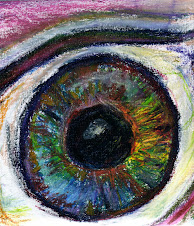Yesterday my editor for the Eye Can Too! Read series of books emailed this: "Today I was reading something and suddenly realized. . . I’d been reading!! I had been reading for a quite a while (5 minutes) without a break-off, and yet also unselfconsciously. After those five minutes I started my breaks again—but I believe I am seeing that your activities are working!! “Break” is my word for my kind of stop-start reading, going back and forth because I’m not comprehending—jumping all over. I think that before doing these activities I could only read for one minute before I started breaking. Maybe less than that."
By "your activities", she meant the activities in the first book in the Eye Can Too! Read series which give graded academic activities designed to give home school students experiences using saccadic eye movements and pursuits- the skills that help people move from word to word and line to line on a page of text without losing their place, skipping words, or getting lost...
When we began working on the book project neither one of us suspected that she had any learning-related vision challenges. She wears glasses- but lots of people do. Glasses correct a person's ability to see clearly at near or in the distance. However, when I took her to see the vision therapy practice in which I work under the supervision of a team of developmental optometrists, she had a huge amount of difficulty doing the most basic eye movement and eye teaming activities. Now, I am not qualified to diagnose anyone about anything, but I could suggest that if she did some of the basic activities in the Purple Book of the series, which became available in September 2008, she would gain ground. And I absolutely recommended that she locate a developmental optometrist in her local area who would be able to give her a comprehensive eye exam and follow up with a customized program of vision therapy.
As we have continued to talk about how she is doing, she has realized that she has never actually read an entire book straight through. Instead, she has developed all kinds of strategies to help her process the book's information - like note-taking and re-reading each paragraph three or four times- habits that make her a very excellent editor. The effort that she must have needed to earn a college degree and an MBA had to be huge. Now she can begin to envision a day when reading will be fun. I am so pleased to have been placed in association with her and I trust that many others who have a life-time of reading difficulties will find the same encouragement to have a comprehensive vision examination by a developmental optometrist no matter how old they are.
Even this morning on National Public Radio's "Morning Edition", Joe Palca reported about his difficulties with 3-d vision because of amblyopia. Amblyopia, or lazy eye, is another condition that responds to vision therapy activities especially when the patient is young. However, new research is demonstrating that even adults can be trained to achieve stereo vision. Palca's report gives a great example of what happens in a vision evaluation and at vision therapy sessions.(http://www.npr.org/templates/story/story.php?storyId=99083752).
Subscribe to:
Post Comments (Atom)





No comments:
Post a Comment